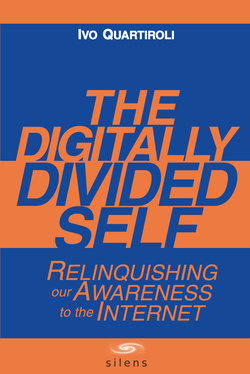Читать книгу The Digitally Divided Self: Relinquishing our Awareness to the Internet - Ivo Ph.D. Quartiroli - Страница 22
На сайте Литреса книга снята с продажи.
Technology “Does” Us
ОглавлениеTechnologies which interact primarily with our minds have an immediate effect on our neurophysiology. For example, research using fMRI on 18 to 26 year olds who average 14 hours a week of violent video showed activation of the amygdala. This almond-shaped structure of the brain in the temporal region is considered part of the limbic system in which our instinctual emotional reactions take place, including modulations of our reactions to threats.
Other experiments demonstrated that only five days of searching with Google by computer-naïve subjects were enough to change their neural circuits, activating in particular the dorsolateral prefrontal cortex – which has an important role in our short-term memory and in the integration of sensory and mnemonic information. Whether we use IT interacting with our minds, or mechanical tools interacting mainly with our bodies, both affect our body-mind – even in permanent ways.
The main body movements required for hi-tech tools are in our hands and fingers with the mouse, the keyboard, or a touch screen. Research by the Proceedings of the National Academy of Sciences (PNAS, 2009) found that hand gestures activate the same brain region as language (the inferior frontal and posterior temporal areas), something which any gesticulating Italian will easily confirm.
Ritual gestures of the hands have always been connected with the activation of inner states of the mind. The mudras of Hinduism are a path of spiritual gestures formed by the hands and fingers. Ancient disciplines such as the tea ceremony or t’ai-chi involve gestures connected to inner development.
The strongest neural connections are between the hand and the brain. Handwriting itself, with its subtle and highly personalized movements, can even give a glimpse of our personality through graphology. What happens when we use technologies which interact almost exclusively with our minds with no or minimal involvement of the body (apart from the obvious cardiovascular and obesity risks in sitting for a long time in front of a screen)?
Is the activation of certain areas of the brain the whole story about the potential of human evolution? Could it be that our cognitive capacities reside as much in every organ and cell of our body – perhaps even beyond our body – as in our brain and nervous system? Consciousness itself cannot be inferred by neuroimaging, much less can we locate wisdom or ethics in the brain.
If London’s taxi drivers developed a part of the brain according to their navigational experience, what happens when we rely only on GPS for our navigation? One of my acquaintances drove his car from the south to the north of Italy. When I asked which route he took and whether he passed one town or another I named, he answered that he had not noticed because he just followed GPS indications. Is there a possibility the same brain areas which develop in taxi drivers can atrophy if they are not used? Even more worrying are studies about the development of frontal lobes of kids.
